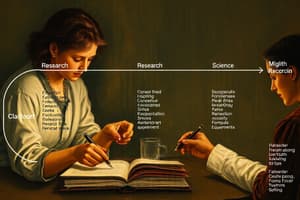Podcast
Questions and Answers
What is the first step in the research cycle?
What is the first step in the research cycle?
Begin with a Problem
What should you do after articulating the goal in the research cycle?
What should you do after articulating the goal in the research cycle?
Divide the Problem into Subproblems
Define hypothesis in the context of research.
Define hypothesis in the context of research.
A logical supposition or educated guess
What is the importance of developing a plan in research?
What is the importance of developing a plan in research?
What do quantitative research methods measure?
What do quantitative research methods measure?
What is the purpose of qualitative research?
What is the purpose of qualitative research?
What is the last step in the research cycle?
What is the last step in the research cycle?
Which of the following statements describes steps in the research cycle? (Select all that apply)
Which of the following statements describes steps in the research cycle? (Select all that apply)
Research is simply gathering information.
Research is simply gathering information.
Qualitative research only deals with numerical data.
Qualitative research only deals with numerical data.
Study Notes
Research Cycle Steps
- Research begins with identifying a problem, driven by an inquisitive mindset.
- Success in research relies on asking the right questions and applying critical thinking.
- Clearly defined goals are essential for addressing specific problems and maintaining intellectual honesty.
Problem Breakdown
- Large problems should be divided into smaller, manageable subproblems to facilitate research.
- This breakdown makes it easier to address complex issues systematically.
Hypotheses and Assumptions
- A hypothesis is an educated guess that provides a logical basis for investigation.
- Assumptions must be scrutinized and scientifically validated—they are statements accepted as true without empirical testing.
Research Planning
- A detailed plan should be created to guide the research process, considering existing data and methods for generating new findings.
- This includes documenting data use, organization, and analysis strategies.
Data Collection and Analysis
- Data collection can be quantitative, measuring variables with tools like questionnaires, or qualitative, exploring deeper complexities and human behaviors.
- Analyzing data involves extracting meaning, which requires drawing conclusions based on hypotheses and logical reasoning.
Interpretation of Data
- Interpretations can be subjective and depend on the reasoning applied to the collected data.
- Understanding the meaning behind data is crucial for arriving at valid conclusions.
Philosophical Foundations
- Effective research is grounded in the belief that phenomena are predictable and lawful, with identifiable cause-and-effect relationships.
- Different philosophical orientations include:
- Positivism, which seeks absolute truths primarily in natural sciences.
- Postpositivism, which recognizes the limitations of observational knowledge.
The Role of Critical Thinking
- Critical thinking is necessary to assess the credibility and worth of information throughout the research process.
- Deductive logic derives conclusions from established premises, while inductive reasoning identifies general patterns from specific observations.
Studying That Suits You
Use AI to generate personalized quizzes and flashcards to suit your learning preferences.
Description
This quiz explores the fundamental steps of the research cycle, emphasizing the importance of starting with a problem. Learn how an inquisitive mind drives research by asking critical questions and identifying unresolved situations. Get ready to enhance your understanding of what research is and how to conduct it effectively.




